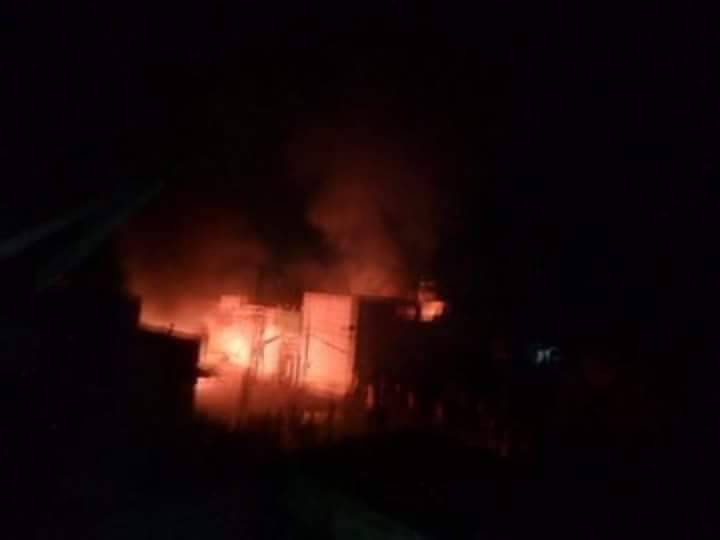
What started as a dispute between two groups over a motorcycle hitting a chicken eventually spiraled into a full blown attack on a religious community. In addition to the firing, stones were also pelted towards the worship place, with slogans against the Ahmadiyya community also echoing in the area.
Ahmadi Mosque set on fire, 6 Ahmadis shot at, and now extremist mob headed towards houses of local Ahmadis in Ghaseet Pura, Faisalabad.
Via Kashif N Chaudhry pic.twitter.com/POLwD2KltM
— NayaDaur (@nayadaurpk) August 23, 2018
Parts of the worship place were burnt, which could’ve set the entire place ablaze had it not been curtailed in time.
Hate-laden continuum
This is the latest incident in the never ending vicious circle of violence against the Ahmadiyya community. In May this year, an historical Ahmadi worship place was demolished in Sialkot under the pretext of “illegal construction.” Another Ahmadi worship place in Chakwal was set ablaze in December 2016.
Also read: In-depth: How Pakistanis celebrated destruction of an Ahmadi worship place
In between the attacks on the worship places in Chakwal and Sialkot, a whole campaign against changes to the Khatm-e-Nabuwwat clause in the nomination papers, which was omitted in the original Electoral Reforms Bill, 2017, took place. This was followed by the Tehrik-e-Labbaik Pakistan (TLP) holding the capital hostage at the end of last year over the abovementioned omission, which resulted in a hike in death threats against Ahmadis, most notably on Eid Milad-un-Nabi.

An Ahmadi worship place in Sialkot that was destroyed by an extremist mob, May 2018.
In March this year Islamabad High Court (IHC) Justice Shaukat Aziz Siddiqui called for the ‘termination of Ahmadis’ in a vaguely worded ruling.
The Ahmadiyya community’s annual report brims over with incidents of discrimination and violence against the sect.
Silence and compliance
Such is the deep rooted animosity against the Ahmadis, that mainstream media almost always fails to cover attacks on the community, refusing to paint them as victims. Any coverage for incidents of Ahmadis or their worship places being targeted are limited to the English press.
Official statements are historically limited to hollow condemnations, which seems to be a mantra that the new Pakistan Tehreek-e-Insaf (PTI) led government seems like following as well.
Human rights minister Shireen Mazari, for instance, was more interested in sending out defensive tweets to the ‘critics’ than supporting the victims by sending in a message of support to the community in the aftermath of the Faisalabad mob attack.
Got back at 2 am this morning to learn of Faisalabad incident. Chkd to see what exactly happened - below is the Regional police head's report. To all critics, our commitment to protection of the rights of all citizens remains a priority. Mob violence in all forms is unacceptable. pic.twitter.com/lgzkMZq3HI
— Shireen Mazari (@ShireenMazari1) August 24, 2018
Information Minister Fawad Chaudhry, meanwhile, reduced the incident to a ‘personal conflict’ and a ‘law and order situation’. One would think it would be pretty hard for him to replicate that for a non-Ahmadi worship place. And even as a ‘place of worship’, it is the state’s duty to provide freedom and security to worship for all its citizens as per the Constitution of Pakistan.
On Nasim Zehra’s show just now, Fawad Chaudhry rejects reports that an Ahmadi “place of workshop” was set ablaze or damaged during this “incident” in Faisalabad https://t.co/Ab6aEX8kHU
— Reema Omer (@reema_omer) August 24, 2018
But of course it is the Constitution itself that is compliant in the persecution of Ahmadis and encourages silence.
Constitutional takfir
The Second Amendment to the Constitution of Pakistan in 1974 ‘mandated’ Ahmadis as non-Muslims. The Penal Code’s Ordinance XX a decade later barred the community from ‘posing’ as such as well. The clauses breach the UN’s Human Rights Charter, the International Covenant on Civil and Political Rights (ICCPR) and paradoxically the Constitution of Pakistan itself.
For, the constitution says that every citizen has the “right to life and liberty”, which in turn entails the basic human right to self-identify. Similarly the Constitution sanctions “freedom to profess religion” and “freedom of religious institution”, both of which should mean that Ahmadis should be allowed to practice their religion, and call it – and their religious institutions – whatever their belief sanctions.
Despite theoretically granting Ahmadis the right to call themselves Muslims, the Constitution also takes away this right, in turn playing its part in legitimizing persecution of the community that it establishes as not only inferior, but also as ‘heretics’
Even so, by apostatizing the Ahmadis, the Constitution practices that very act of takfir that forms the foundation of radical Islamist terrorism. For the likes of ISIS and Taliban, those that don’t comply with their brand of Islam are infidels, which is why they are targeted by these groups.
And hence despite theoretically granting Ahmadis the right to call themselves Muslims, the Constitution also takes away this right, in turn playing its part in legitimizing persecution of the community that it establishes as not only inferior, but also as ‘heretics’.
Also, by taking away certain rights and freedoms from a single community, what the Constitution also sanctions is the apartheid against the Ahmadis.
The Ahmadiyya question
As long as the Ahmadis are excommunicated by the Constitution, they would be vulnerable to mob attacks even when members of the community are involved in conflicts of personal nature. Therefore, the Ahmadiyya question will forever remain a litmus test of Pakistan’s progress, till it is aptly answered through democratic foundations and universal human rights.
The only way the Ahmadis would have security – which is only possible if they’re granted equality – is if Pakistan embraces secularity
These ascertain, in no uncertain terms, that all individuals are equal in the eyes of the law, and possess the same rights. And while that gives the Ahmadis the right to self-identify as Muslims, what is largely ignored is that it would in no means coerce Muslims of other sects into accepting them as such.
It is only under a truly democratic setup and a secular Constitution that religious beliefs of individuals would be reduced to a personal matter, which anything involving the conscience can only ever be. And hence, the only way the Ahmadis would have security – which is only possible if they’re granted equality – is if Pakistan embraces secularity.
Not only would that ensure the sectarian violence is thoroughly delegitimized, it would also safeguard non-Muslim communities in the country. Most importantly, this would allow the state to take an unequivocal opposition against religionist violence, which is perpetuated by terror groups and has been the single biggest factor in cementing Pakistan’s volatility in the recent past.
